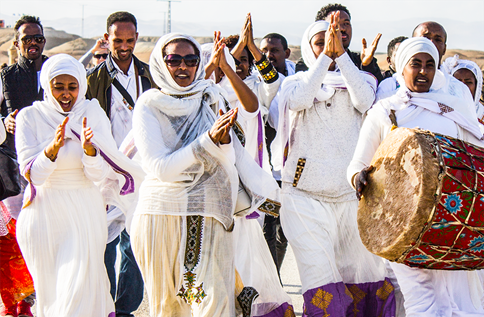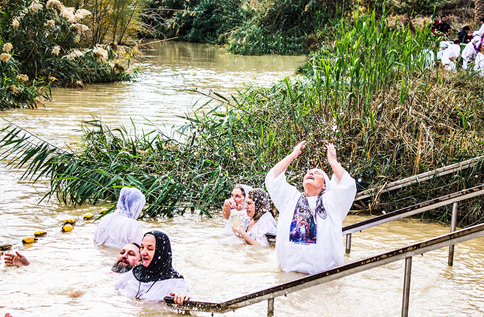The churches located on the site of Christ’s Baptism are finally being cleared of landmines after sitting empty and abandoned for 50 years.
In a rare example of multi-faith collaboration in the Middle East, The HALO Trust began to clear explosive debris from the site shortly before Holy Week 2018. The project has the support of the Israeli and Palestinian authorities and local faith leaders.
The site, known as Qaser al-Yahud and situated on the western bank of the River Jordan, is believed to be where John the Baptist baptised Christ. It is the third holiest site in the Christian world after the Church of the Nativity in Bethlehem and the Church of the Holy Sepulchre in Jerusalem. Eight church compounds, including one belonging to the Roman Catholic Church and seven Eastern Orthodox Churches were built in the 1930s but were deserted when anti-tank mines and other explosive hazards were laid around them after the 1967 Six Day War.

January 2018: Ethiopian pilgrims visit the small part of the Baptism site cleared in 2011.

Pilgrims in the River Jordan, Epiphany January 2018. Access is via a path through mined churches.
HALO began clearance in March 2018 in a church compound belonging to the Ethiopian Orthodox church. The remaining churches, owned by the Armenian, Coptic, Greek, Romanian, Russian, Syrian orthodox churches and the Roman Catholic church will be cleared over the coming months.
HALO is now seeking to raise the remaining funds needed to complete clearance. The project has been funded to date by the Government of Israel, a range of Christian churches, philanthropists and the public.
A team of Israeli, Palestinian and Georgian deminers is clearing the site using detectors and armoured mechanised equipment. Once the site is cleared, the churches can be restored and visited by people of all faiths in safety. Around 570,000 pilgrims visited a restricted part of the river bank last year, which was opened to the public in 2011.
HALO’s work at the Baptism Site has attracted the attention of Christian leaders worldwide, including His Holiness Pope Francis. The Archbishop of Canterbury, leader of the Anglican worldwide communion, visited the site in May 2017. All the leaders of the Churches who own the church buildings or land have given the project their blessings.

Archbishop Welby has given his support to the clearance project.
![]()
A painted iconostasis revealed through a shell-hole in the Romanian Church.
James Cowan, CEO of the HALO Trust said: "The HALO Trust is grateful to the Israeli Ministry of Defense, the Israeli National Mine Action Authority, the Palestinian Authority and all those who have contributed over the last two years to bring the project to its starting point. Removing explosive hazards at the Baptism site is a commitment to inter-faith reconciliation. It supports the Christian Churches through a practical, visible action which will also resonate with the hugely popular global campaign to rid the world of landmines. HALO is now appealing to the public to raise the final funds so that our Israeli, Palestinian and Georgian deminers can complete the work and make this sacred site safe for all time."
Marcel Aviv, Director of the Israeli National Mine Action Authority said: "This is a very exciting and long-awaited, day indeed. The demining of the Baptism Site- a place so significant to so many- is such a unique and wonderful opportunity. The cleaning and releasing of these lands, and the ability to return them to their religious guardians, is a project we take great pride in."
Brigadier Ossama Abu Hanina, Director of Palestinian Mines Authority Centre said: "The Palestinian Mine Action Centre is grateful to the HALO Trust for all of its humanitarian mine clearance activities in the West Bank and is proud to be involved in this unique project which resonates with Christians and people of all faiths here on River Jordan and beyond.”
Learn more about the site of the Baptism of Christ and how you can support this unique project.



 Visit our HALO USA website
Visit our HALO USA website
